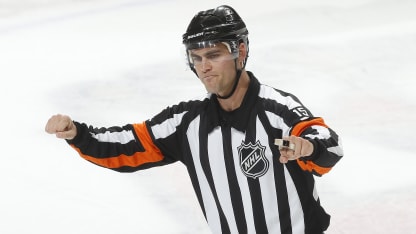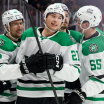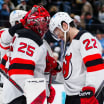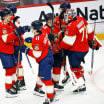Where can I access Player Safety's Supplemental Discipline videos and educational videos?
You can access the Department's Supplemental Discipline and educational videos on NHL.com/playersafety.
The educational videos show the standards we use when considering Supplemental Discipline.
Where does the Department of Player Safety monitor games?
The Department of Player Safety watches every NHL game from a state-of-the-art video room at the League headquarters in New York City. The video room consists of 25 high-tech monitors that stream both the home and away broadcast of every game. When a specific play requires further review, the Department uses editing software to clip the play and all relevant replays. This video is then emailed to the entire Department within minutes.
When considering Supplemental Discipline, does it matter if there was a penalty called on the ice?
No, Supplemental Discipline may be assessed to any Player regardless of whether or not the infraction was penalized by an on-ice official.
If a penalty is called, does the Supplemental Discipline have to match the call by the on-ice official?
No, an infraction that leads to a suspension or a fine can be categorized differently than the call on the ice. In addition, Supplemental Discipline for breaking multiple rules can be imposed on a specific play.
Why is injury taken into account when deciding Supplemental Discipline? And what other factors are taken into account?
Per Article 18.2 in the CBA between the NHL and the NHLPA:
"... In deciding on Supplementary Discipline for On-Ice Conduct, the following factors will be taken into account:
(a) The type of conduct involved: conduct in violation of League Playing Rules, and whether the conduct is intentional or reckless, and involves the use of excessive and unnecessary force. Players are responsible for the consequences of their actions.
(b) Injury to the opposing Player(s) involved in the incident.
(c) The status of the offender and, specifically, whether the Player has a history of being subject to Supplementary Discipline for On-Ice Conduct. Players who repeatedly violate League Playing Rules will be more severely punished for each new violation.
(d) The situation of the game in which the incident occurred, for example: late in the game, lopsided score, prior events in the game.
(e) Such other factors as may be appropriate in the circumstances."
Who attends a hearing? What is the purpose of a hearing?
A hearing consists of the offending Player, the offending Player's General Manager, members of the NHLPA, and the offending Player's agent, as well as senior members of the Department of Player Safety.
The purpose of a hearing is to interview the Player and his representatives about the play in question. No decision on Supplemental Discipline is made until the Player is given the opportunity to explain his actions.
What is the difference between a telephone hearing and an in-person hearing?
If the Department of Player Safety determines that any Supplemental Discipline from an infraction will result in five games or less or a fine of more than $5,000, the hearing is conducted by phone.
If the infraction might require a suspension of six games or more, the offending Player is offered the opportunity to an in-person hearing. In this case, the Player remains suspended until the hearing takes place. If the Player waives his right to an in-person hearing, the hearing will be conducted by phone.
What is a "Repeat Offender"?
A Player is considered a repeat offender for 18 months following his most recent incident that resulted in a suspension. His status as a repeat offender in this category is used to determine the amount of salary forfeited should he receive another suspension.
It is important to note that even if a Player is not defined as a repeat offender, his past history may come into consideration when determining future Supplemental Discipline.
How much money does a Player forfeit when suspended?
Non-repeat offenders lose salary based on the number of days in the season. For example, if there are 190 days in a season, a three game suspension would cost a non-repeat offender 3/190ths of his average salary.
Repeat offenders lose salary based on the number of games in a season (82). For example, a three game suspension would cost a repeat offender 3/82nds of his average salary.
How much money does a Player forfeit when fined?
Players may be fined up to 50% of one day's average salary without exceeding $10,000 for the first fine and $15,000 for any subsequent fines within a 12 month calendar period.
Where does money forfeited through fines and suspensions go?
The money is put into the NHL Players' Emergency Assistance Fund.
What are automatic suspensions?
Automatic suspensions are independent of Supplemental Discipline imposed by the Department of Player Safety. A Player can receive Supplemental Discipline for a game misconduct; however, that particular game misconduct would not count towards his total for the relevant category. Players are automatically suspended if they incur multiple game misconducts in these categories:
• General Category
• Abuse of Officials Category
• Stick Infractions Category
• Physical Fouls
Separate from the categories above, these infractions carry automatic suspensions without the accumulation of game misconducts:
• Three Instigator penalties in one Regular season
• Two Instigator penalties in the Playoffs
• A Player who receives an Instigator penalty in the final five minutes of regulation time or at any time in overtime
• Physical Abuse of Officials
• Leaving the Bench for the purpose of starting an altercation
Can a Player who receives Supplemental Discipline appeal the Department's decision?
Yes. Players may appeal all on-ice discipline to the Commissioner, provided written notice of the appeal is provided within 48 hours. The Commissioner will endeavor to hear all appeals on an expedited basis and will determine whether the decision was supported by clear and convincing evidence. A subsequent appeal right to a neutral arbitrator will be available for suspensions of six (6) or more games. The neutral arbitrator shall have full remedial authority in respect of the matter. The standard of review will be whether the League's finding of violation of the League Playing Rules and the penalty imposed were both supported by substantial evidence.
In all appeals (first to the Commissioner and then to the neutral arbitrator), the Player will remain suspended pending appeal (unless the full term of the Player's suspension has run).
The Commissioner and the neutral arbitrator may consider new evidence relating to the incident even if such evidence was not available at the time of the initial supplementary discipline hearing and decision or, in the case of an appeal to the neutral arbitrator, at the time of the Commissioner's hearing or decision.






